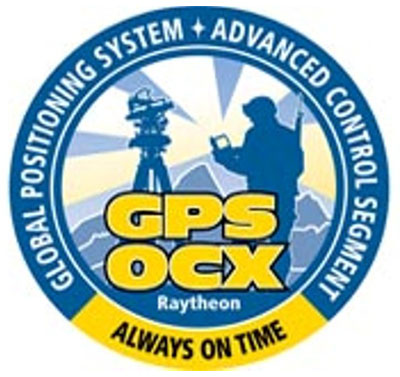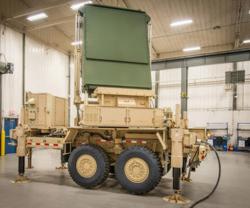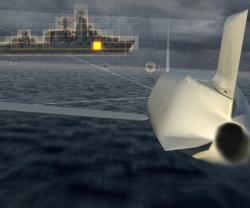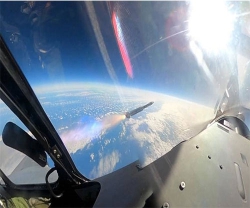Raytheon GPS Launch Receives IATT Certification
06.09.2013 North America
Raytheon received Interim Authorization to Test (IATT) security certification for the Global Positioning System Next Generation Operational Control System (GPS OCX) Launch and Checkout System (LCS) four months ahead of schedule.
Raytheon received a one-year certification with no liens, meaning the government does not require any changes. The LCS IATT certification enables Raytheon to move to the next stage of testing the Launch and Checkout System in preparation for launch of the first GPS III satellite.
“Successful IATT certification ahead of our original schedule demonstrates not only that Raytheon meets the U.S. Air Force's high standards for information assurance as we develop this critical national system, but also the efficient efforts of our government partners,” said Matthew Gilligan, Raytheon's GPS OCX Program Manager and a Vice President in Raytheon's Intelligence, Information and Services business.
“Typically IATT certification is given for six-month increments; the LCS one-year accreditation speaks to the quality of the information assurance design and threat protection,” he added.
The Interim Authorization to Test not only includes the LCS, but also Lockheed Martin's GPS III satellite support systems, including the Exercise and Rehearsal Training Tool and Upload Generation Tool.
Raytheon's OCX and the Lockheed Martin-built GPS III satellites are critical elements of the U.S. Air Force's effort to modernize the GPS enterprise while improving capabilities to meet the evolving demands of military, commercial and civilian users worldwide. OCX is being developed in two "blocks" using a commercial best practice iterative software development process. There are seven iterations in Block 1 and one in Block 2. LCS is the fifth Iteration of Block 1, and it successfully completed Critical Design Review in June 2013.
The first GPS III satellite is in production at Lockheed Martin and expected to be delivered to the U.S. Air Force "flight-ready" in mid-2014. GPS III satellites are expected to deliver three times better accuracy, provide up to eight times more powerful anti-jamming capabilities, and include enhancements that extend spacecraft life 25 percent further than the prior GPS block. The GPS III also will carry a new civil signal designed to be interoperable with other international global navigation satellite systems, enhancing civilian user connectivity.
Raytheon received a one-year certification with no liens, meaning the government does not require any changes. The LCS IATT certification enables Raytheon to move to the next stage of testing the Launch and Checkout System in preparation for launch of the first GPS III satellite.
“Successful IATT certification ahead of our original schedule demonstrates not only that Raytheon meets the U.S. Air Force's high standards for information assurance as we develop this critical national system, but also the efficient efforts of our government partners,” said Matthew Gilligan, Raytheon's GPS OCX Program Manager and a Vice President in Raytheon's Intelligence, Information and Services business.
“Typically IATT certification is given for six-month increments; the LCS one-year accreditation speaks to the quality of the information assurance design and threat protection,” he added.
The Interim Authorization to Test not only includes the LCS, but also Lockheed Martin's GPS III satellite support systems, including the Exercise and Rehearsal Training Tool and Upload Generation Tool.
Raytheon's OCX and the Lockheed Martin-built GPS III satellites are critical elements of the U.S. Air Force's effort to modernize the GPS enterprise while improving capabilities to meet the evolving demands of military, commercial and civilian users worldwide. OCX is being developed in two "blocks" using a commercial best practice iterative software development process. There are seven iterations in Block 1 and one in Block 2. LCS is the fifth Iteration of Block 1, and it successfully completed Critical Design Review in June 2013.
The first GPS III satellite is in production at Lockheed Martin and expected to be delivered to the U.S. Air Force "flight-ready" in mid-2014. GPS III satellites are expected to deliver three times better accuracy, provide up to eight times more powerful anti-jamming capabilities, and include enhancements that extend spacecraft life 25 percent further than the prior GPS block. The GPS III also will carry a new civil signal designed to be interoperable with other international global navigation satellite systems, enhancing civilian user connectivity.
Previous PostMEADS Identification Friend or Foe System Certified
Latest news
Latest events
DefenPol China2025 - 7th Guangzhou International Defense & Police Exhibition & Summit
11 - 12 Jul 2025Nan Fung International Convention & Exhibition Center (NICEC) - ChinaIDEF 2025 Turkey - International Defence Industry Fair
22 - 27 Jul 2025Istanbul Expo Center - TurkeyDSEI 2025
09 - 12 Sep 2025Excel, London - United KingdomIntersec Saudi Arabia
29 Sep - 01 Oct 2025Riyadh International Exhibition & Convention Centre - Saudi Arabia






















